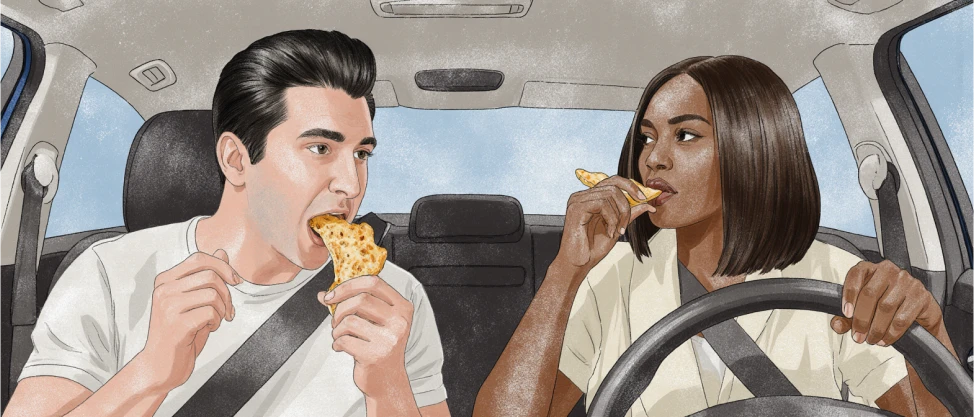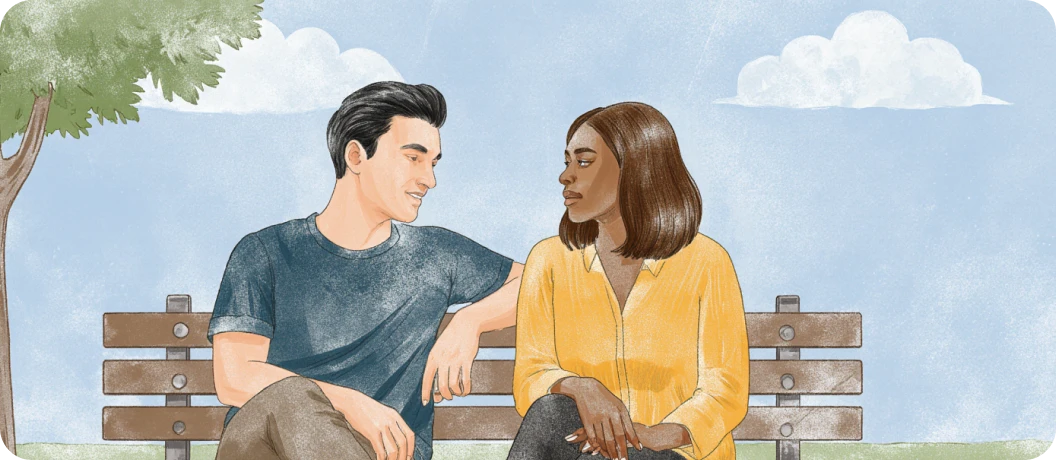Friendships are one of the most valuable aspects of life. According to the American Psychological Association, having close friends helps manage obstacle-filled situations effectively [1]. Subsequently, a lack of good friendship is a major health risk factor, competing with the effect of cigarette smoking, according to research on social relationships and mortality risk [2].
So, how to be a better friend? In this article, we’ll explore practical ways to be a better friend and why it’s important to invest in friendships.
What Does It Mean to Be a Good Friend?
Being true friends goes beyond simply spending time together or offering the occasional compliment. Typically, it includes:
- Show up consistently and be there during tough times.
- Listen with empathy, offering a safe space without judgment, and truly hear what the other person is saying.
- Maintain boundaries and understand and honor emotional, physical, and personal limits.
- Communicate honestly, build trust, and speak the truth with kindness, showing the real self.
- Support without trying to fix or minimize the other person’s feelings.
- Give and receive support so that the friendship feels mutual and healthy.
- Let your friend know they matter and that their presence is meaningful to you.
Want to understand yourself better and become a more supportive friend? Take the “Am I Toxic?” Test to gain insights into your behavior patterns and learn how to build healthier, stronger friendships.
10 Tips to Be a Better Friend
If you’re wondering how to be a better friend, here are 10 ways to strengthen your friendship:
1. Be a Good Listener
This means giving your friend your full attention when they speak, validating their feelings, and offering thoughtful responses. For instance, instead of interrupting or offering solutions right away, listen actively and show empathy.
Sometimes, one of the best ways to be a better friend is to support a friend by simply letting them vent or express their emotions honestly.
2. Be Reliable and Empathetic
If you wonder, “How can I be a better friend?” try to remain dependable and consistent. For example, when you say you’ll be there for your friend, follow through. Being reliable may deepen trust and show your friends they can count on you.
As an illustration, if your friend is moving to a new place and needs help with packing or lifting boxes, offer your support. Even if it’s not the most convenient time, you could say, “I know it’s a lot, but I’ve got your back. Let me know what time works best for you!”
In the same way, when your friend is having a rough time, strive to be there for them. Try to understand what they’re going through and show you care. Sometimes, just saying “I’m here for you” or “I get how you feel” can really make a difference.
Curious how strong your empathy and emotional awareness are? Take the Emotional Intelligence Test to explore how well you understand your own emotions and others. It’s a great step toward becoming a more present, compassionate friend.
3. Celebrate Their Wins
One of the best ways to be a better friend is to celebrate their successes, including their promotion, some good news, or their new accomplishment. Showing your friends that you’re really happy for them can make them feel valued.
For example, imagine that your friend gets their dream job. You can celebrate their wins with excitement to make them feel appreciated. Show them you’re genuinely happy for their success and growth. Send a message like, “I’m so proud of you! I know you’ve worked so hard. You totally deserve this!”
Moreover, you can even try to make this day extra special for them. For instance, treat them to dinner or plan a small hangout with a few friends. You may also order their favorite food, raise a glass to them, or just spend time celebrating together.
4. Communicate Openly and Honestly
If you think, “How can I be a better friend?” just be real with your friend about how you’re feeling, what’s on your mind, and what you need. If something’s bothering you, talk about it in a respectful way.
Don’t be afraid to be emotionally available, show your weaknesses and talk about your problems. As studies published by American Psychological Association have shown, frankness and vulnerability don’t push people away, but, on the contrary, evokes empathy, which can develop into friendship [3].
This also works the other way around: if we open up to a person, we generally begin to like them more. This usually speaks to achieving a sense of safety, which is an important factor in all relationships.

5. Respect Boundaries
- Physical boundaries could be about personal space or touch, like if someone doesn’t want hugs.
- Emotional boundaries are about how much a friend wants to share emotionally. For example, if your friend says they’re not ready to discuss a topic, respect that and don’t press them to open up.
- Mental boundaries can involve respecting someone’s need for space or time to themselves. For instance, if your friends express this need, respect it and try to not take things personally.
6. Don’t Give Unasked Advice
Research on mutuality in close friendships shows that the happiest pairs of friends were those where both people respected each other’s independence and decisions [4]. This kind of mutual respect also helps boost self-esteem.
That’s why someone wondering, “How can I be a better friend?” should avoid giving unsolicited advice. If your friend is opening up, they might not be looking for advice and just need someone to listen. You may help them find a solution on their own. For instance, you can ask self-reflection questions like: “What are you thinking about doing next?” or “Do you have any ideas on what to do?”
In the same way, if you think your friend is about to make a bad decision, you can gently express your concerns by saying something like, “I’m worried about this choice. Have you thought about…?” Let them find the solution themselves with your support.
Do you often try to give advice to your friends?
7. Don’t Live by the “Give-and-Take” Rule
If you want to be a good friend, don’t make others feel like they owe you. Don’t keep track of who gave you the best gift or did you a favor. Do nice things for your friend because you care, not because you expect something back.
8. Encourage Their Growth
Do you wonder how to be a better friend? Typically, friends may push you to be the best version of yourself, and you should do the same for them.
Nicole Arzt, LMFT, explained how to encourage friends to grow.
Sometimes, the best way to encourage a friend to take care of themselves is by modeling it yourself. This means actively practicing good self-care and honoring your self-worth. It means establishing and implementing healthy boundaries. It also means letting your friend know that you always have their best interest at heart.
9. Initiate Communication
Making and keeping friends as an adult can be tricky, mainly because of busy work and family life. But even with a packed schedule, you can usually find time for a quick call every couple of weeks.
A large study by physicists and sociologists found that talking to someone at least once every 15 days is enough for them to see you as a close friend. If you can’t meet face-to-face as often, keep communication open through texts, phone calls, or other digital means.
10. Be Non-Judgmental
Friendships grow stronger when both people feel accepted for who they are. Instead of criticizing or judging your friend’s choices or lifestyle, offer support and encouragement. Even if you don’t always agree, respect their decisions. Among other things, being a better friend means remaining non-judgmental to help your friends feel safe and be themselves without worrying about rejection.
Why Is Being a Good Friend Important for Our Mental Health?
Here are some key reasons why healthy relationships with friends are so important:
1. Emotional Support
Good friends are there to listen when you need to talk or receive valuable feedback. Research on the link between social support and resilience to stress shows that having solid support helps provide emotional relief in difficult times [6].
Being a better friend means offering that same emotional support in return, creating a safe space where both of you can freely express yourselves. Typically, friends also celebrate your successes and help you learn from your mistakes.
2. Improved Life Balance and Emotional Health
This is another reason to explore the ways to be a better friend. When you have strong, trusting relationships, you’re less likely to feel lonely, according to a series of studies on how friendship influence our well-being [6]. Positive friendships help you feel validated, loved, and appreciated.
Moreover, the study published in National Library of Medicine, found that spending time with friends can boost your happiness. Whether you’re laughing over coffee, talking about your dreams, or simply enjoying a quiet moment in each other’s company, the presence of great friends adds joy to life.
If you want to strengthen your mental health and make your friendships thrive, try science-backed practices and customized routines in the Breeze app. It’s a simple way to track your mood, learn how to feel your feelings, and increase self-awareness with daily mood notes, journaling and mindful exercises.
3. Better Communication
Friendships may also teach you how to become a better friend and how to communicate better in other areas of your life, and help you to increase emotional intelligence in the workplace. Naturally, when you care about someone, you want to understand their feelings, thoughts, and needs.
This, in turn, can improve your overall communication skills, making you a more empathetic and effective communicator.
Common Friendship Challenges and How to Overcome Them
Below are some common friendship difficulties and simple, practical ways to overcome them:
1. Jealousy
The jealousy level of insecure attachment people is significantly higher than that of secure attachment people, according to recent research on insecure attachment [7]. Thus, jealousy may be a signal of insecurities, and it’s worth reflecting on why a person feels this way.
If you feel jealousy, instead of harboring negative feelings, ask: What am I really afraid of? It may be a fear of abandonment, low self-esteem, or feeling worthless that may have roots in past experiences like inconsistent caregiving, emotional neglect, or relationships where love felt conditional.
Remember that healthy and strong friendships allow space for other relationships, too. It doesn’t mean they care about you any less.
Instead of letting jealousy control your actions, talk to your friend openly, focusing on your emotions rather than accusing them. For example, say something like, “I know this might sound silly, but I’ve been feeling a little insecure lately. I really value our friendship, and I just needed to say it out loud.”
If you want to know how early patterns can shape how you see yourself in relation to others, take an insightful Childhood Trauma Test!
2. Distance
If your friend seems distant, it could be a sign that they need some space. Giving them a bit of time without pressuring them for explanations is one of the best ways to be a better friend.
For instance, you could say something like, “I’ve noticed you’ve been quieter lately. I just want you to know I’m here if you need anything, but I understand if you need some space.” This lets your friend know that you respect their need for space, but that you’re still there when they’re ready.
3. Different values or beliefs
You can have open communication about your core values without it turning into an argument. Remember that the essence of your friendship should always come first. Focus on what you have in common instead of letting differences create distance. If the disagreement is too big or emotional to ignore, it’s okay to agree to disagree.
True friends may have different values in some areas. These different opinions should be discussed openly, without one of you imposing their opinion on the other. Try to listen to what your friend has to say and think about their background and why they think this way.
We asked Nicole Arzt, LMFT, how to know when it’s time to let go of a friendship.
Letting go of a friendship is a deeply personal decision. You’re entitled to have your own values and boundaries in every relationship. If you no longer feel you’re getting much out of the friendship – or if the other person doesn’t seem to respect your needs – it may be time to reevaluate your dynamics. You deserve to spend time with people who care about you and honor your worth.
Frequently asked questions
1. What if I’m the one who needs more support from a friend?
Rather than waiting for them to figure it out, be honest about what you need. You could say, “I’ve been feeling a bit off lately and could really use your support. It would mean a lot if you could just listen or offer some advice.” The key to being a better friend is to express your needs without being accusatory.
2. How can I help my friend be more confident?
Try to compliment them on their achievements, talents, or qualities you admire, but be specific with your praise rather than generic. Instead of saying, “You’re great,” say, “I really admire how you handled that tough situation at work. You were so calm and collected.” Encourage them to try things they might be uncertain about. Let them know you believe in them and offer to help them take small steps toward their goals.
3. How do I manage disagreements with friends?
Listen actively to your friend’s perspective without interrupting. Acknowledge their feelings and, if appropriate, apologize for your part in the issue. Managing disagreements is often about mutual understanding, patience, and the willingness to move forward.
Sources
- Adams, R. E., Santo, J. B., & Bukowski, W. M. The presence of a best friend buffers the effects of negative experiences. 2011.
- Julianne Holt-Lunstad, Timothy B. Smith, J. Bradley Layton. Social Relationships and Mortality Risk: A Meta-analytic Review. July, 2010.
- Collins, N. L., & Miller, L. C. Self-disclosure and liking: A meta-analytic review. 1994.
- Deci EL, La Guardia JG, Moller AC, Scheiner MJ, Ryan RM. On the benefits of giving as well as receiving autonomy support: mutuality in close friendships. March, 2006.
- Ozbay F, Johnson DC, Dimoulas E, Morgan CA, Charney D, Southwick S. Social Support and Resilience to Stress. May, 2007.
- American Psychological Association. The science of why friendships keep us healthy. June, 2023
- Song I, Kwon JW, Jeon SM. The relative importance of friendship to happiness increases with age. July, 2023.
Disclaimer
This article is for general informative and self-discovery purposes only. It should not replace expert guidance from professionals.
Any action you take in response to the information in this article, whether directly or indirectly, is solely your responsibility and is done at your own risk. Breeze content team and its mental health experts disclaim any liability, loss, or risk, personal, professional, or otherwise, which may result from the use and/or application of any content.
Always consult your doctor or other certified health practitioner with any medical questions or concerns
Breeze articles exclusively cite trusted sources, such as academic research institutions and medical associations, including research and studies from PubMed, ResearchGate, or similar databases. Examine our subject-matter editors and editorial process to see how we verify facts and maintain the accuracy, reliability, and trustworthiness of our material.
Was this article helpful?







